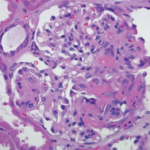
Vasculitis expert and former editor of The Rheumatologist Dr. Philip Seo gives us his picks for the most important abstracts in ANCA-asociated vasculitis from the International Vasculitis Workshop 2024.
The 21st International Vasculitis Workshop, held in Barcelona in April 2024, reviewed advances in diagnostic tools, assessment methods and treatment options for the small-vessel vasculitides. This article highlights important points regarding the treatment of ANCA-associated vasculitis and IgA vasculitis.
1. Abatacept for relapsing, non-severe GPA.
Abstract O-008: Langford et al.1
Although most patients with granulomatosis with polyangiitis (GPA) will enter remission with standard immunosuppressive therapies, relapse is common. Approximately half of patients with GPA will flare within three years of their initial diagnosis.2 Patients with non-severe GPA may have an even higher rate of relapse than patients initially diagnosed with the life-threatening form of this disease.
Abatacept is a monoclonal antibody directed against cytotoxic T-lymphocyte associated protein-4 (CTLA-4) commonly used for the treatment of rheumatoid arthritis. Langford et al. explored the utility of abatacept as a treatment for patients with relapsing, non-severe GPA.
In this study, 65 patients with relapsing, non-severe GPA were randomized to receive treatment with weekly subcutaneous abatacept 125 mg or a placebo in combination with a 12-week glucocorticoid taper. Equal numbers of patients in both groups experienced relapse or worsening disease (62% vs. 68%, P=0.255). Treatment with abatacept did not impact time to full remission, duration of glucocorticoid-free remission relapse severity, prevention of damage, patient-reported quality of life or adverse events.
Relapsing, non-severe GPA is particularly challenging to treat, and differentiating disease activity from damage and infection is not straightforward. Even under the best of circumstances, it can be difficult to prove that an intervention is efficacious for this population. This study cools enthusiasm for abatacept as a treatment for GPA. Notably, it does not exclude the possibility that abatacept may still be useful for patients newly diagnosed with GPA or other specific subpopulations.
2. Impact of plasma exchange on early renal improvement in ANCA-associated vasculitis.
Abstract O-010: Odler et al.1
Plasma Exchange and Glucocorticoids in Severe ANCA-Associated Vasculitis (PEXIVAS), a multi-center, randomized controlled trial of 704 patients with severe ANCA-associated vasculitis, failed to demonstrate that plasma exchange led to a reduction in the incidence of death or end-stage kidney disease.3 However, a subsequent meta-analysis, which included data from PEXIVAS, indicated that plasma exchange does reduce the risk of end-stage kidney disease at 12 months.4 However, the mechanism underlying this observation has been unclear.

